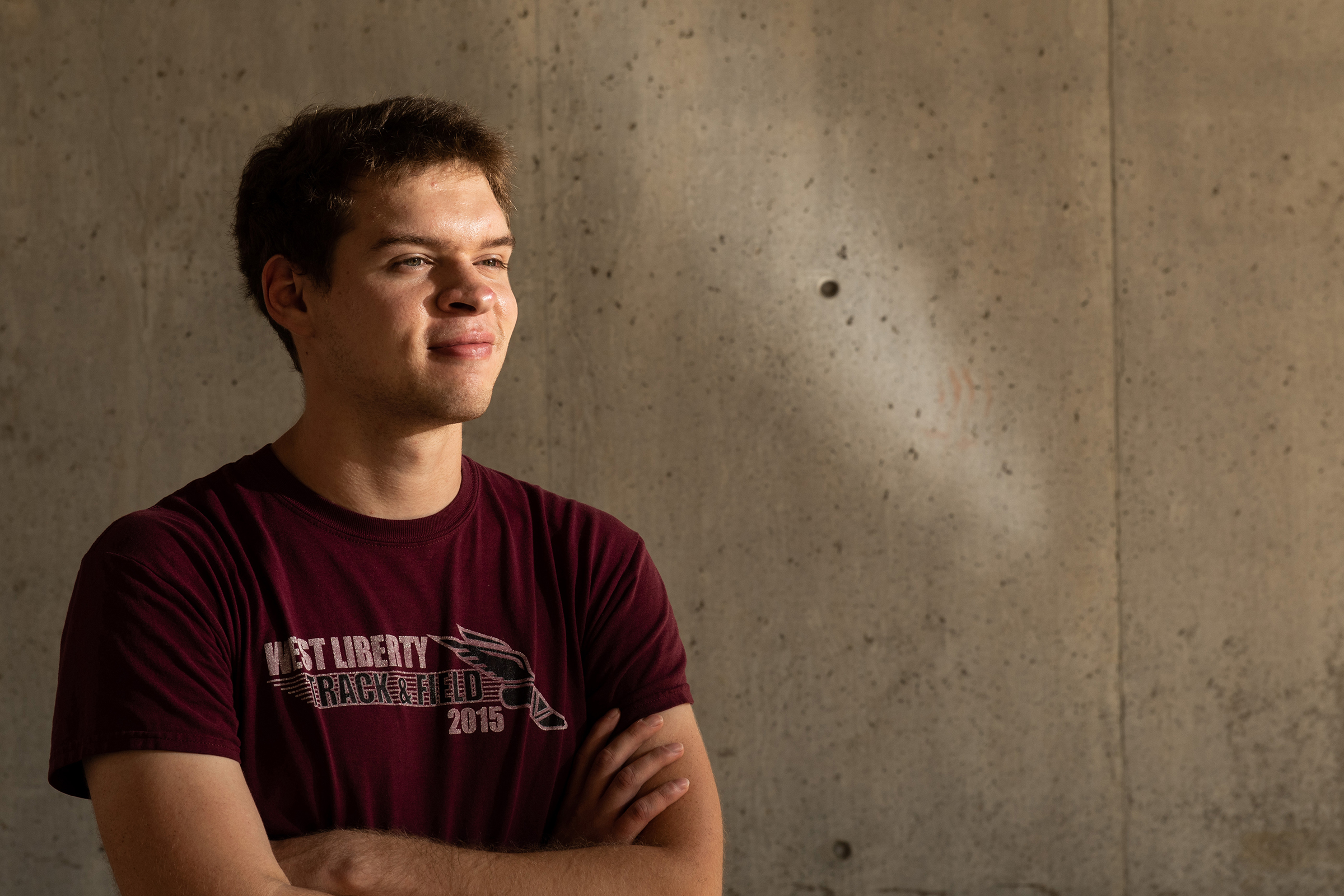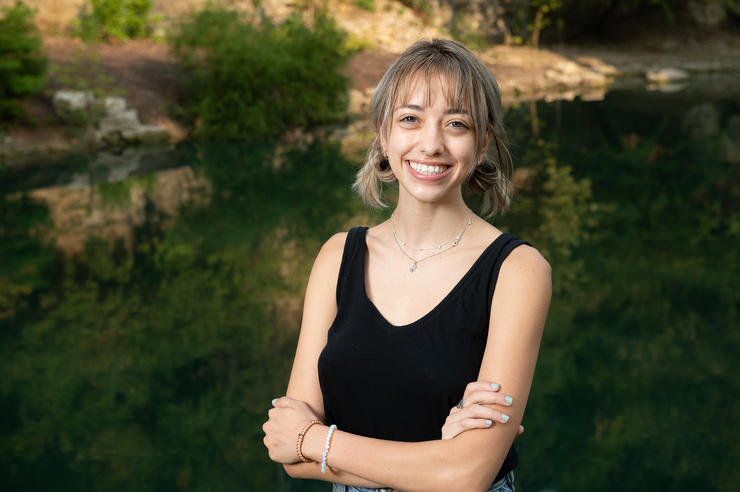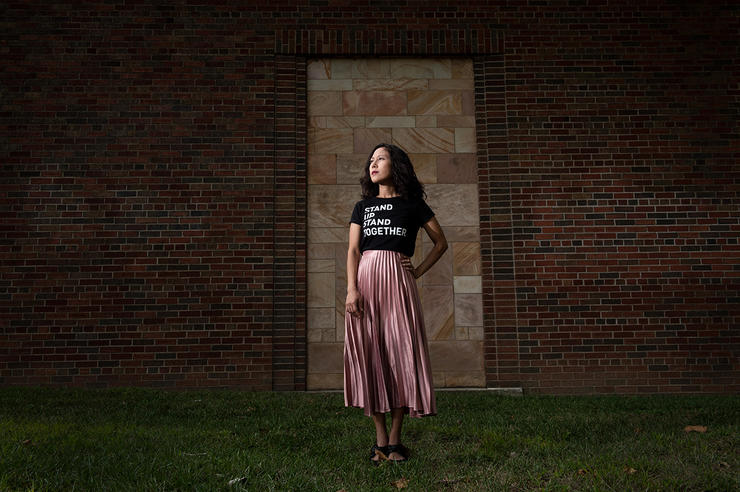Exploring the mystery behind how things work

Armando Revelez doesn’t back away from challenges. In fact, he runs toward them.
When the West Liberty, Iowa, native came to the end of his sophomore year of high school, he found something was bothering him.
“So many kids in high school take a math or science class and don’t think it will be useful,” Revelez says. “I didn’t want that to be the case. I wanted to find out why it’s useful.”
He proceeded to take all the math and sciences courses he could the last two years of high school. But that wasn’t enough. He wanted to do more with it.
“You talk to peers who aren’t first generation and you realize the extra help they had growing up and getting to college. It opened my eyes to what being a first-gen student means. But then I talk to my friends in TRIO and they understand; they had the same struggles.”
Growing up just 20 miles from Iowa City, Revelez was familiar with the University of Iowa campus. He also grew up watching his sister work hard in school, graduate as valedictorian, and get her degree in teaching at the University of Iowa.
When Revelez got to campus, he was torn between majoring in computer science or electrical engineering.
“I took an AP computer science class in high school and did well in it. It just clicked for me,” Revelez says. “I didn’t know anything about electrical engineering. I decided I might as well challenge myself and go into something I had absolutely no idea about. It’s more interesting that way.
“It’s amazing that we take for granted not knowing how many things are made or built,” the now fourth-year electrical engineering student says. “I thought it would be cool to go to school for four years and be able to look at something and understand how it works and why it’s important. I want to learn the mystery behind these things.”
As a first-generation college student, Revelez says TRIO Student Support Services made a great impact in helping him adjust to college.
“You notice the difference between first-generation students and non-first-generation students,” Revelez says. “You talk to peers who aren’t first generation and you realize the extra help they had growing up and getting to college. But then I talk to my friends in TRIO and they understand; they had the same struggles.
“It opened my eyes to what being a first-gen student means,” Revelez continues. “But I hope students in towns like West Liberty, where I grew up, know that it’s possible to be successful in engineering or other intense majors despite being in an environment with peers who have had more of an advantage coming into college.”
Revelez says the people he has met through TRIO such as Angela Lamb, Eric Moy, and Cody Pritchard have helped him grow as a student and as a person, encouraged him to speak up and try new things, and have become friends as well as mentors. They also played a role in his being accepted this year into the joint BS/MS degree program in the Department of Electrical and Computer Engineering by providing reference letters and recommending him for a summer 2020 internship at Collins Aerospace.
TRIO SSS serves students at the University of Iowa who demonstrate academic need and are first generation, low-income, or have a verified disability. Through success coaching, tutoring, and a one-semester-hour course each semester, student focus on topics such as academic skill- building, professional development, financial literacy, and leadership.
While working at Collins Aerospace, Revelez says he could easily see how what he was learning in the classroom fit into the professional world.
“Everything I’ve learned about in the past three years in some way, shape, or form, showed up in what I was doing in my internship,” Revelez says. “I was very fortunate to have been working on something that tied together all these aspects of electrical engineering that I’ve been studying.”
Cody Pritchard, project director of TRIO Student Support Services, says he has been lucky to work with many incredible students at Iowa, and Revelez is one of the hardest-working students he has had the pleasure to come across.
“He has this unique combination of not only the desire and ability to succeed but the self-awareness to recognize the steps necessary to achieve his goals,” Pritchard says. “Coupled with all of this is a level of humility that allows him to pause, ask questions, seek guidance, and truly listen to others. I’m proud to know him and have the opportunity to be a small part of his journey. “
Along with his work in the classroom and internship, Revelez points to another experience that has shaped his life: working in food service. Revelez has worked 20 to 25 hours a week since coming to Iowa, first at Hy-Vee and more recently at University of Iowa Hospitals & Clinics.
“Everything I’ve learned from being a line cook has helped me a lot,” Revelez says. “It sounds crazy, but it’s true. I’ve never done something so nerve-wracking as having to cook food for people in a short manner. It helped me learn how to be organized and deal with pressure. When I talk to people about job-related things, I use that as a reference. I don’t feel like you understand what work is until you go through something like that.”
Revelez last spring took on another challenge when he became a teaching assistant for a computer science class, Computers in Engineering. This fall, he’ll be a TA for a course on electronic circuits.
Often referred to by such names as 4+1s, 3+2s, or dual degrees, undergraduate-to-graduate (U2G) programs provide students with the opportunity to complete two degrees, a bachelor’s and a master’s, in five years instead of six.
“It’s helped my understanding of the subjects a lot more—I’ve had to reteach myself some things that maybe went a little over my head when I learned them originally so that I can teach other people,” Revelez says. “I really like it, but it’s a lot harder than I thought. I appreciate TAs more now.”
As Revelez prepares to graduate in spring 2021, his next steps are already in motion. Collins Aerospace invited him back for a second internship next summer, and then he’ll return to Iowa in the fall to finish his MS degree. Revelez says he is grateful that his adviser suggested he apply to the joint BS/MS program and that his TRIO mentors supported him through the process.
“I never expected to go to grad school,” Revelez says. “But Iowa fosters that transition. The individuals in the Department of Electrical and Computer Engineering watch over you and take time to cater to their students and give them opportunities. I’m blown away that I get to be in this program and that I will have my bachelor’s and master’s degrees in five years.”


